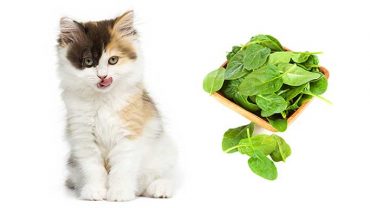A cat begging for human food is not an unfamiliar sight. And neither is the sight of the cat owner gladly offering human food to the feline.
What many pet owners don’t realize is that the digestive system of cats is quite different from that of humans. That’s why experts generally discourage pet owners from serving human foods to their furry companions.
However, not all the foods that we eat are potentially harmful to our pets. In fact, there are quite a few human foods that are pretty safe for cats. The problem comes when the cat consumes more than what’s considered safe for it.
Take a case of spinach. Being a vegetable, most of us should naturally shy away from offering it to our feline friends. That’s because cats are obligate carnivores. Therefore, their digestive systems aren’t designed to process plant matter.
But is spinach harmful to cats? Can cats eat spinach, and how much of the vegetable is considered too much?
The short and straight answer is “yes,” cats can eat spinach only in small amounts, as consumption beyond the recommended amounts could lead to oxalate poisoning. So, if your cat has a history of renal complications, then you might want to give spinach a wide berth.
Also as a pet owner, there are things you need to watch out for.
Read on for more insights into cats and spinach. Some of the areas the post shall address include the health benefits of spinach for cats, potential side effects, and how to feed this vegetable to your feline friend.
Table of Contents
What Are The Health Benefits Of Spinach?
One way to answer the question “can cats have spinach?” is to explore the possible benefits of this vegetable.
Spinach packs a host of health and nutritional utilities. Most of the tests on the health and dietary advantages of spinach have been conducted on humans.
However, your feline companion could also benefit from a diet of spinach, one way or another.
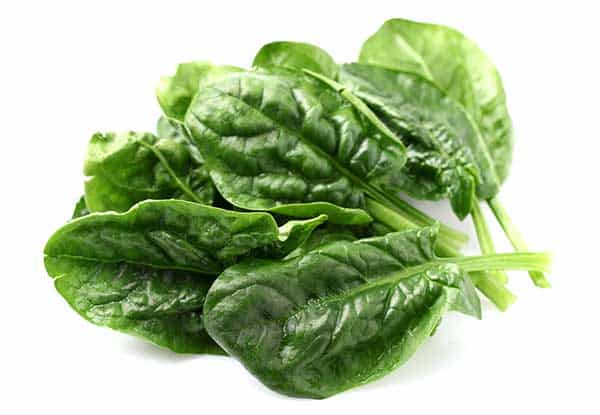
The following are some of the reasons you might consider incorporating spinach into your feline’s diet.
1. Regulation of Blood Pressure and Prevention of Heart Disease
Heart disease is a debilitating condition that affects felines nearly the same way it affects us.
The condition is not only difficult to treat, but it’s also a precursor to even more severe complications, like heart failure. Therefore, the best way to fight feline heart disease is to prevent it from happening in the first place.
Spinach contains an abundance of essential minerals, such as nitrates. These minerals are renowned for their ability to keep blood pressure in check.
According to this study, a diet laden with nitrates can significantly decrease the risks of developing heart disease.
2. Prevention of Cancer
Cancer is one of the most dreaded conditions, and rightfully so.
When it strikes, it leaves a cat extremely weak and lethargic, if not dead altogether. On the other hand, the cat owner is left emotionally and financially devastated.
Thankfully, you can ward off this life-threatening condition by occasionally treating your feline to a diet of spinach.
According to certain research studies, spinach contains two significant compounds that help slow down the growth and proliferation of cancerous cells. These include SQDG and MGDG.
Additionally, the vegetable packs numerous antioxidants that collectively help prevent cancer.
In addition to fighting cancer, spinach is rich in antioxidants that help prevent oxidative stress. Therefore, it boosts your cat’s immunity against other diseases, such as diabetes and arthritis. The antioxidants in spinach also prevent premature aging.
- High protein cat food dry formula with real chicken as the first ingredient
- Natural with prebiotic fiber nourishes specific intestinal bacteria for digestive health
- Wholesome cat food dry kibble with vitamin A and Omega-6 fatty acids to nourish skin and coat
Last update on 2025-02-26 / Affiliate links / Images from Amazon Product Advertising API
3. Boosting of Eyesight
Spinach boasts carotenoids that are associated with improved vision. Examples include lutein and zeaxanthin. Together, these carotenoids work to prevent your cat from developing cataract or macular degeneration.
As you may know, these two conditions are the primary causes of feline blindness. The best part is, lutein and zeaxanthin can even reverse an already existing eye condition.
4. Relieving Indigestion and Regularizing Bowel Movements
Constipation is a common digestive complication among felines. And spinach is one of the most effective remedies for it.
Spinach is packed with insoluble fiber. Insoluble fiber is the form of dietary fiber that doesn’t dissolve in water. Instead, it moves through the cat’s stomach, almost the same way it was ingested.
As a result, it helps bulk stool as the food moves through the cat’s intestines, thereby helping regularize bowel movements.
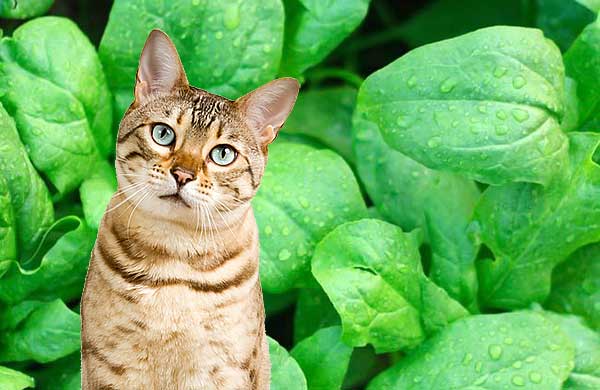
To completely ease indigestion, the fiber in spinach is complemented by the high water content in the vegetable. A 100-gram serving of raw spinach boasts over 90% water content. This could significantly help relieve constipation as well as dehydration in cats.
The above-highlighted are not the only health and nutritional advantages of spinach.
Remember that the vegetable also contains a host of other crucial minerals and vitamins. Examples include Vitamins A, C, and K1, as well as iron, calcium, and folic acid. Each of these comes with positive impacts on your feline’s overall health.
But in spite of all these numerous health benefits, you might still be wondering to yourself, can I give my cat spinach?
- A tasty & body nourishing treat for cats & dogs - Essential fatty acids for a healthy coat.
- Healthy, powerful Omega fatty acids - This premium Salmon Oil is rich with Omega-3 & Omega-6 fatty acid from EPA & DHA, that can...
- Help your pet stay looking great - The rich Omegas in Salmon Oil are a dog health supply to nourish skin and coat and keep your...
Last update on 2025-02-26 / Affiliate links / Images from Amazon Product Advertising API
Moderation Is Key!
While you can offer spinach to your feline friend, experts encourage doing so in moderation. And by moderation, we mean a leaf or two, served occasionally.
As we mentioned earlier, cats are obligate carnivores. Therefore, they can live exclusively on a diet of meat. Adding spinach to their food once in a while shouldn’t be a problem, though. Just ensure you offer the vegetable as a treat or a reward for good behavior.
Never should spinach replace your feline’s staple diet. So, is spinach safe for cats?
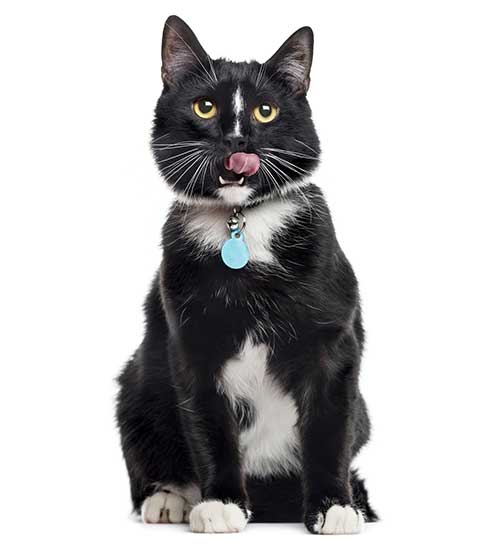
Apart from moderation, there are a few more precautions you should take when offering spinach to your cat.
For instance, which is the better option between raw and cooked spinach? Can cats eat raw spinach leaves? How about the cooked vegetable, can cats eat cooked spinach?
Well, raw spinach leaves contain oxalates, which could turn out to be somewhat toxic for your feline companion. We’ll discuss the potential hazards of oxalates in the subsequent section.
The best way to offer spinach to your cat is by cooking the vegetable first. However, the method of preparation also matters a lot. For instance, is it best to fry, steam, boil, or smoke the vegetable?

Avoid giving your cat fried spinach, as that exposes the cat to worrying levels of unsafe fats.
However, even when boiling the vegetable, ensure you don’t add in salt, pepper, spices, or any other condiments considered harmful for pets.
Once prepared, you can serve the vegetable to your cat as a standalone food, or mix it into the cat’s regular food.
Remember, the dilemma of giving either boiled or raw spinach to cats is one many pet owners face from time to time. And while boiled spinach is generally recommended, it isn’t always the ideal option.
Indeed, there are instances when raw spinach could be safer and more beneficial for a cat. As humans, we can readily consume raw spinach as part of a salad.
Sadly, most ingredients we use to make salads comprise of the very foods considered harmful for cats. But if you can successfully eliminate these ingredients, then you’re better off serving raw spinach to your feline.
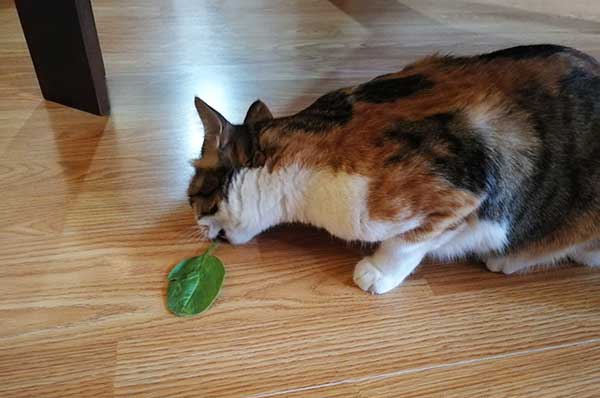
As we already mentioned, one major drawback of raw spinach is the presence of oxalates. However, remember that boiling also destroys certain essential elements in spinach, such as folic acid.
So at times, you might be tempted to offer the vegetable raw. If you must, ensure you only give your cat fresh spinach.
Besides, wash the vegetable thoroughly in clean water to remove any debris or aerosol residues from the leaves. While you’re at it, consider tossing away the tough stems, as your feline might choke on them.
There’s also the question of baby spinach and whether it’s more beneficial to the cat than mature spinach. Certain studies indicate that baby spinach could contain more oxalates. Therefore, they aren’t the best for cats.
- Number 1 veterinarian-recommended cat probiotic brand to support digestive health (Kantar Veterinary Tracker, 2021), making it an...
- Purina Pro Plan Sensitive stomach cat food supplement for the dietary management of kittens and adult cats with cat diarrhea
- Digestive Care Cat Food supplement containing probiotics proven to promote intestinal health and balance
Last update on 2025-02-27 / Affiliate links / Images from Amazon Product Advertising API
Is Spinach Poisonous For Cats And What Should I Watch Out For?
Having discussed the advantages of offering spinach to your cat in moderation, you may still be wondering, is spinach good for cats? And should I exceed the required portions, can the vegetable get toxic for my feline friend?
While spinach isn’t harmful to cats per se, consumption beyond the recommended amounts could lead to oxalate poisoning.
Oxalates are a significant risk factor for kidney stones. So, if your cat has a history of renal complications, then you might want to give spinach a wide berth.
The following are some of the symptoms of kidney stones:
- Frequent or infrequent urination
- Nausea and vomiting
- Loss of appetite and diminished energy
- Fever
- Blood in urine, sometimes in stool as well
- Abdominal pains
- Urinary tract infection
- Sudden loss of weight, occasioned by the inability to eat.

Apart from kidney stones, the oxalates present in spinach are also associated with iron and calcium deficiencies. The risks are more real if your cat consumes too much of the vegetable.
There are also the dangers of suffering allergic reactions. Like humans, cats also suffer various forms of food allergies. Common allergy symptoms include nausea, diarrhea, vomiting, and skin rash.
Lastly, you might also want to watch out for addictions. Addiction is hazardous, especially if the vegetable causes adverse effects each time the cat consumes it. In such cases, you may consider alternatives, such as peas and carrots.
Conclusion: So, is spinach bad for cats?
Spinach is very healthy for cats. But remember, cats survive primarily on animal protein. Fruits and vegetables should be offered only as treats.
In the case of spinach, you should exercise heightened caution, as high amounts of the vegetable could prove disastrous.
Spinach contains oxalates that are known to interact adversely with a cat’s renal and digestive system. So, the best way to offer spinach to cats is in moderation. Better yet, consult your vet before introducing the vegetable into your feline’s diet.
Checkout Our Favorite Cat Products
1. Best Online Course For Cat Parents
Our favorite: The Cat Language Bible (How to Finally Understand And Speak to Your Cat) – A new form of cat to human communication that many cat owners have dreamed about… but few have actually thought possible.
2. Best Immune Support For Cats
Our favorite: Tomlyn Immune Support – Best Supplement for Cats and Kittens.
3. Best Cat Treats
Our favorites: LIFE ESSENTIALS All Natural Freeze Dried Chicken And Sheba Meaty Tender Sticks – Both are Great.

